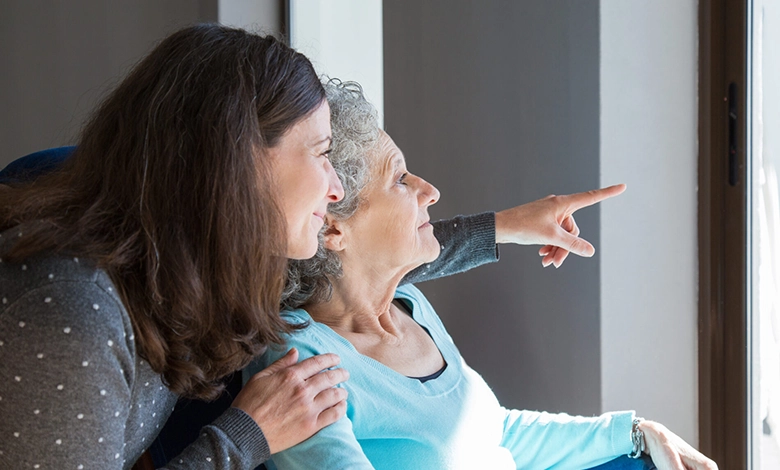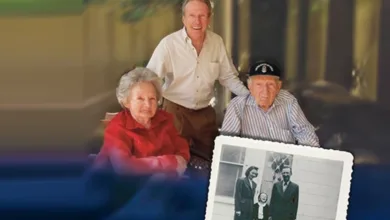Dementia Caregiver Tips for Families: The Journey Ahead
Walking alongside: How to support your loved one with compassion and understanding

If you’re facing a dementia diagnosis for a loved one, you’re about to embark on a journey like none you’ve experienced before. At the James L. West Center for Dementia Care, we’ve spent 32 years developing what we call a “walking alongside” approach—meeting families wherever they are on their journey and providing the support needed every step of the way.
This perspective can bring comfort not only to those living with dementia, but also to family members and caregivers who are learning how to provide support.
Understanding the dementia journey
Our work serving families has led us to three essential conclusions about dementia caregiving:
First, the person with dementia is not a problem to be solved. They are someone who needs to be loved and nurtured.
Second, the entire family is on the dementia journey with their loved one. We support and educate family and friends because their commitment is essential to creating a loving, trusting experience.
Third, “walking alongside”—rather than delivering insights at arm’s length—creates a closeness and caring relationship that respects dignity and results in a close bond.
What to expect as a new caregiver
If you’re a newcomer to the dementia journey, you’ll be experiencing this situation for the first time. It’s essential to realize that your loved one may become confused and even frightened as they begin to experience changes that can upend their reality. They may not recall where they are. The time will likely come when they may not recall who you are.
You need to understand that these are normal progressions, and they do not reflect on you as a family member or caregiver. You are dealing with a disease trapped inside your family.

Four essential dementia caregiving tips for families
At The West Center, we believe that “walking alongside” is the best path to take for your loved one living with dementia. This means practicing four approaches that have proven to be quite effective for this journey.
Accept the changes
Accept the fact that your loved one is changing mentally and emotionally. Things that were second nature—such as simple habits of good hygiene or eating meals—will become challenging. They are likely to forget names and even where they are.
Acceptance of changes is key to reducing your own stress and providing better care.
Offer constant reassurance
Reassure your family member that they are loved, safe, and important. They may frustrate you with their forgetfulness or anxiety, particularly when they can’t say the right words to express themselves.
Remember: Someone living with dementia is not giving you a hard time; they are having a hard time.
Live in their moment
Many years ago, a friend shared his frustrations because his father, whose Alzheimer’s disease had advanced, lived in a world where he thought he was fishing. My friend tried to bring his father back into today’s reality, which only frustrated both of them.
My advice was for my friend to join his father in his “fishing expeditions” and watch what happened. He called the next day with a revelation. “Yesterday, I decided to follow Dad into his world rather than try to bring him back into mine,” he said. “He was doing his imaginary ‘fishing’ and I said, ‘Dad, look… there’s a big fish that jumped over here.’ He whipped around and did an imaginary cast and yelled, ‘I’ve got him, Son. I’ve got him!'”
“It was the best day we had experienced in two years, and it totally turned around our relationship for the final two years of his life.”
Engage the senses
Recognize the valuable role that the senses of touch, smell, sight, and sound play in their lives. When your loved one becomes anxious, you can help calm them and the environment by speaking in a soothing voice while gently massaging their arm or hand.

Using sensory memories to connect
Particularly around the holidays, bake cookies or fresh bread—these familiar aromas can trigger memories of special meals and cherished family gatherings from their past. Whether it’s the scent of freshly baked goods or traditional dishes your family enjoys, these comforting smells can help them relive meaningful moments.
Watch the smile on their face when you turn your TV to YouTube and show them their favorite performers from their youth. I’ve seen dozens of people start shuffling their feet to old Elvis or Frank Sinatra videos, and I’ve also witnessed tears and looks of peace in the eyes of seniors as they connect with beloved music and melodies.
Sharing favorite family movies during your visits—whether it’s a casual drop-in, a special occasion, or a holiday—can unlock treasured memories and create meaningful moments of joy.

The benefits of this approach
Supporting our loved ones facing the dementia journey shows we are on the journey with them. We are at their side, rather than watching from a distance or trying to bring them to our reality.
As family members and caregivers adopt this approach, they reduce the stress they have been experiencing and bring joy to both their loved ones and themselves.





